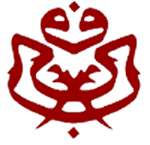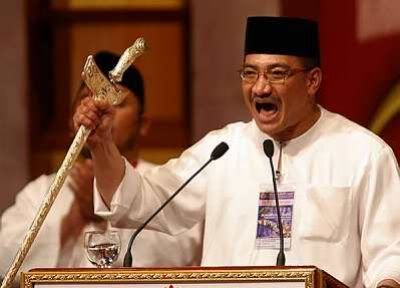by
Fan Yew Teng


Excerpts: Read here for more
It is perhaps important and necessary to examine some of the more persistent myths upon which Umno, the predominant party in the ruling coalition for the past 52 years, grew and deceived - and are still deceiving - the populace, particularly the Malays.
For a start, after 61 years, Umno is still unashamedly the political party which claims to unite and represent all the Malays. Hence, the misnomer the United Malays National Organisation, always in English, however much you might want to remind them of their claim to be champions of Bahasa Malaysia and Malay nationalism.
Most Malaysians who have been around for the past quarter of a century would very likely know or remember the interesting power struggles within Umno during the Mahathir years (1981 - 2003).
However, up to this very day, many Malaysians in general and many Umno members and supporters in particular are woefully ignorant of the tensions and undercurrents among the earlier generation of Umno leaders.
One of the enduring myths that has dominated Umno all these years is that its founding fathers - or at least the early leaders - were all self sacrificing and had always put party unity - and by extension, national unity - before personal interests.
The truth, however, is more complicated.
UMNO's History
May 1946. Umno is born, as a movement of many Malay organisations and groups against the Malayan Union, a constitutional arrangement created by the returned British colonial masters after the Second World War.
Dato Onn Jaafar of Johore became the man of the moment after the British decided to withdraw the Malayan Union scheme, to be later replaced by the Federation of Malaya constitutional arrangement. Umno, as a confederation of Malay organisations throughout Malaya and Singapore, was triumphant.
But there were already problems of disunity.
As a matter in fact, even before Umno was established, Dato Onn had faced some hostility from some influential Malay leaders in his home state of Johore. There were some strong differences between Dato Onn and Dato Abdul Rahman bin Mohd Yasin, a pre war Johore Treasurer in regard to the behaviour of Sultan Ibrahim over the MacMichael Treaties (for the Malayan Union).
Dato Abdul Rahman and some other Malay leaders in Johore had thought that Dato Onn was being too kind towards the Sultan. His two sons, Sulaiman and Dr Ismail (later Tun Dr Ismail) had refused to join Umno until after Dato Onn’s resignation as Umno president in 1951.
More serious was the withdrawal of the Persatuan Kebangsaan Melayu Malaya (PKMM), the Malay Nationalist Party, from the Umno confederation at the Umno meeting in Ipoh on 29 and 30 June, 1946.
Ostensibly, the withdrawal was due to differences over the Umno flag. But, as Firdaus Haji Abdullah points out in his book Radical Malay Politics, “behind this issue, there were serious and substantive disagreements over policy.”
The PKMM’s proposal for the symbol was defeated by one vote. After a lengthy speech by Ahmad Boestamam, he and all other PKMM representatives and supporters walked out.
The Malay left had broken ranks with Umno. At the same meeting, and for the same reason, the Persatuan Pekerja-Pekerja Junior Malaya also withdrew from Umno.
In mid 1947, when it was proposed to turn Umno into a political organisation and that affiliate member organisations should dissolve themselves and merge completely into Umno, the move was opposed by several organisations which, apart from the fear of losing their identity, were established long before Umno itself. Moreover, there were organisations whose leadership were drawn from the working class rather than the aristocracy and the English educated administrative group.
Thus, the Singapore Malay Association, the Sabak Bernam Malay Association and Saberkas of Kedah (which had some radical and ’socialist’ orientation), chose to remain as associate member organisations only rather than dissolve themselves.
The Perikatan Melayu Kelantan and the Kesatuan Melayu Johore withdrew completely from Umno.
More serious splits were to come.
In February 1950, mainly to draw away support from the Hizbul Muslimin, the Muslim Party formed during the second week of March 1948, UMNO formed a body within itself called the Persatuan Ulamak Sa-Malaya. Haji Ahmad Fuad, Dato Onn’s friend, became the leader of this body.
(Consider for a moment the irony and hypocrisy of Umno leaders who now say that politics and religion shouldn’t mix)
In June 1951, however, the Persatuan Ulamak Sa-Malaya teamed up with another Islamic group consisting of former adherents of the Hizbul Muslimin, at the former’s meeting in Kepala Batas, Penang. At this moment, the Persatuan Ulamak Se-Malaya decided to change its name to Persatuan Islam Sa-Malaya,to be known in short as PAS.
Another shock was waiting for Umno.
After Umno had rejected Dato Onn’s proposal to open Umno to the non Malays and transform it into a Malayan political party, he resigned formally from Umno on 26 August, 1951. His position was taken over by Tunku Abdul Rahman, then an unknown deputy public prosecutor.
After Merdeka in 1957, the public perception of the Tunku as prime minister and Abdul Razak as his deputy was that their relationship was one of great harmony. Some even characterised it has a father and son kind of relationship. But it was only valid for a while.
For none other than the Tunku himself had exploded the myth that his relationship with Razak was as harmonious as commonly believed. Writing in the 29 August 1983 issue of The Star (and later reproduced in his book Contemporary Issues in Malaysian Politics), the Tunku related a telling incident in this vein:
“Once at the Residency, Khalid Awang Osman, the former High Commissioner to India, mentioned in front of Tun Razak that he (Razak) would have to wait for a long time before he could become the Prime Minister. I could see the shocked surprise on the face of Tun Razak. As it happened, after that day I noticed his attitude took a change.”Well, well, from the horse’s mouth, so to speak. The myth of an almost perfect political and working relationship was, well, just a myth.
In an article published in The Star on 20 February 1978, the Tunku said that Asiaweek’s M.G.G Pillai had alleged in the 17 February 1978 issue of that magazine that “many political figures still insist privately that the Tunku stepped down unwillingly in 1970 and that he was in fact pushed aside by Tun Abdul Razak.”
The Tunku commented:
“As regards the late Tun Razak pushing me aside, he made no attempt openly to do so but it must be admitted that he felt a bit small to be my deputy for so long, and being an ambitious man, he would no doubt have liked to take over as prime minister. Only those around him wanted to take over dramatically and with a blare of trumpets.”It may be true that Tun Razak made no attempt openly to push the Tunku aside. But did he make any attempt secretly to do so? And who were those around Razak?
Mahathir, Musa Hitam, Harun Idris, Syed Jaafar Albar? And some other Umno extremists or ultras?
It is interesting to note that the Tunku, in reference to what Khalid Awang Osman said, as mentioned earlier, had added: “I took the remarks as a joke, but soon after things began to happen.”
What things began to happen?
Well, in an interview with Asiaweek, published on 10 May 1985, exactly 16 years to the day after the fateful general elections on 1969, the Tunku actually blamed Tun Razak and other colleagues for his political downfall. In relating the charged atmosphere just before the 1969 general elections, the Tunku said:
“It started when one of them (alleged communists) was killed near the airport, and they asked for a funeral procession to bury the dead. I would never have allowed that. But I was not there. I was away campaigning. But my colleagues, who were trying to make trouble for me, gave permission, and so when the communists carried the body, they stopped at every corner to harangue the people, to curse the government, to curse me…”Responding to further questioning, the Tunku actually said that “My deputy allowed it”, meaning the procession.
To another question, the Tunku said:
“I couldn’t have stayed on. To stay, you have to be sure of the loyalty of your friends and colleagues. I wasn’t sure. In fact I was very, ah, frustrated with the behaviour of some.”The Tunku had often said that he wanted to be the “happiest prime minister in the world” - but how could he be happy when some of his friends and colleagues wanted to stage a coup against him?
In order to get rid of the Tunku politically, some criminal elements and over ambitious leaders in Umno orchestrated the bloody May 13 Massacre which killed a few hundred Malaysians, maimed a few hundred more other Malaysians, burned down a few hundred shophouses and homes and looted some of them and burned scores of cars and other vehicles. All crimes against humanity.
No inquiry after 38 years. Who says law is law?
Why then no rule of law as far as the May 13 Massacre is concerned?
Why is this continued rape of law being allowed?
In whose interests?
And what about other Umno crimes against humanity like the Memali Massacre in the mid 1980s?
When will there be an accounting? Where is the transparency? And where is the much talked about integrity? Including the integrity of the law?
No comments:
Post a Comment